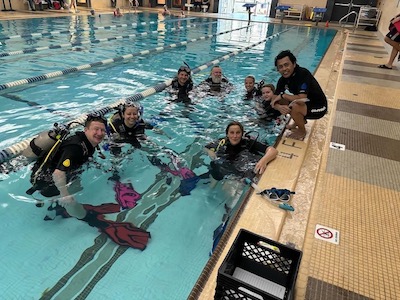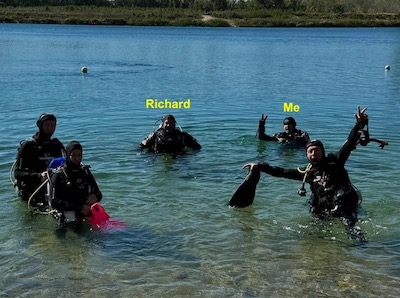What to Expect in Your Open Water Certification Class
Choosing Your Learning Format
When you sign up for your Open Water Certification, you will typically have two options for completing the required academic portion:
- Online + Classroom – Self-paced online study with some in-person classroom sessions.
- Classroom Only – Traditional instructor-led classroom sessions for all academic content.
Every scuba certification agency structures their study materials differently, as they are commercial entities that decide how to allocate their resources. The core material across agencies remains the same, but how it's presented and delivered varies. Some agencies invest heavily in online learning platforms, while others may focus more on in-person instruction.
I personally prefer to avoid sitting in long classroom sessions, so I opted for the Online + Classroom option. This format allowed me to go through the material at my own pace and focus more on hands-on skills when I got to the in-water training.
For help selecting a dive shop and instructor, check out our guides on Choosing a Dive Shop and Choosing a Dive Instructor.
Pool and Confined Water Training

Regardless of which study format you choose, you will spend time in a pool or confined water setting learning essential scuba skills. This includes:
- Equipment setup and breakdown
- Proper weighting and buoyancy control
- Regulator clearing and retrieval
- Mask clearing techniques
- Air-sharing drills with a buddy
- Basic emergency procedures
Your instructor will ensure you are comfortable with these foundational skills before moving on to open water dives.
Open Water Dives

After successfully completing the academic and confined water portions, you will participate in a series of open water dives. These dives are where you put everything into practice in a real-world environment. Expect to:
- Perform the skills you learned in the pool in a natural setting
- Experience varying water conditions like currents, visibility changes, and different temperatures
- Develop confidence in your ability to handle real dive situations
Most agencies require at least four open water dives to earn your certification, though this can vary based on the training program.
If You're Feeling Nervous
It’s completely normal to feel nervous about learning to dive. Breathing underwater for the first time is a unique experience, and everyone adjusts at their own pace. Here are a few tips if you’re feeling unsure:
- Take it slow – Don’t rush through skills. If you need more time to get comfortable, let your instructor know.
- Communicate your concerns – A good instructor will listen and help you work through any difficulties.
- Practice breathing exercises – Relaxed, controlled breathing makes a huge difference in comfort underwater.
- Get comfortable in water – If you're not used to being in the water, spend extra time swimming or snorkeling before your course.
- Remember, mistakes are part of learning – No one is perfect right away, and that’s okay!
Most divers who start out nervous find that with practice, they gain confidence quickly. The key is to focus on your own progress and not compare yourself to others.
My Thoughts on Open Water Training
Your Open Water class is the foundation of your diving experience. If you take it seriously and get quality instruction, you’ll set yourself up for success in all your future dives. I strongly recommend taking the time to master buoyancy and trim, as these skills will make diving more enjoyable and effortless. Also, don’t hesitate to ask questions—your instructor should be a resource, not just someone checking off skills on a list.
No matter which agency you certify through, diving is a skill-based activity, and the learning doesn’t stop at certification. Keep diving, keep learning, and most importantly—have fun!
Final Thoughts
Your Open Water Certification is just the beginning of your diving journey. While it equips you with the fundamental skills to dive safely, comfort and confidence come with experience. Many divers choose to continue their education with additional courses or simply log more dives to refine their skills.
If you have questions about different training agencies or what to expect in your specific course, feel free to ask!